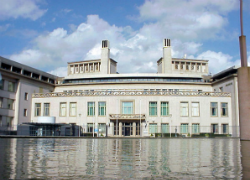This is a summary of the Prosecution’s cross examination of witness RM255 on July 19, 2012 in the war crimes case against General Ratko Mladic.
Bosnian Serb ex-army chief Ratko Mladic oversaw the Serb army “obliterating everyone like a fire,” a protected witness said Thursday. Separated by Serb soldiers from his family while trying to evacuate, the protected witness, referred to only as RM255 by the court, was taken to a field to be executed by gunfire with the other males from his village. As the bullets rained down and bodies fell, the witness escaped into the nearby woods at night after untying his hands. In the field where his fellow villagers were shot now stands two fruit trees and a mass grave filled with the “ground up” bones of multiple persons.
“They tried to hide it . . . in the woods . . . in the mountains . . . each year they find more graves.”

The witness was called to testify in the Mladic trial to provide details on the July 1995 Srebrenica massacre, which Prosecutors have called the key to charging Mladic. Prosecutors at the International Criminal Tribunal for the Former Yugoslavia (ICTY) allege that Mladic, the commander of the Army of Republika Srpska (VRS) from 1992 to 1996, played a pivotal role in coordinating and overseeing the methodical slaughter by VRS of more than 7000 Bosnian Muslim (Bosniak) men and boys in and around the town of Srebrenica. The indictment against Mladic contains 11 counts, charging Mladic with genocide, crimes against humanity, and violation of the law and customs of war. After 16 years on the run, Mladic was finally arrested on May 26, 2011 in Serbia and was extradited to The Hague to face trial. Mladic has pleaded not guilty to all counts of the indictment.
During July of 1995, the near constant shelling Srebrenica town drove the witness and thousands of other Bosniaks to seek protection by United Nations Protection Forces in Potočari. On July 12, 1995, Serb soldiers arrived in Potočari with gifts of bread and an offer to transport the refugees to an area free of gunfire and violence. Although the witness entertained serious doubts about the intent of the VRS, he and other villagers “headed out because Srebrenica was falling.”
“Did people shuffle to get on the bus? Of course, it was death and life!”
The night before getting on the buses, the witness testified that he and the other refugees could hear the cries and screams of their fellow villagers. Although this happened over ten times, the witness said that the Serb soldiers were “making fun out of it” and that “a woman had a baby.”
The next day, as the refugees lined up for the buses, men and boys “as young as 15” were picked out of the crowd one by one and separated from their families. The witness, like the other male refugees, was told by Serb soldiers that he was needed for questioning and would be returned to his family shortly. Serb soldiers then proceeded confiscate his identification and belongings before herding him and the other male refugees into a house in the village. Once inside, the men were forced to sit shoulder to shoulder without any room to move.
After two hours, the Serb soldiers removed the witness and the other men to a nearby school for two days, where the witness said that soldiers not only beat the men, but denied them water and the use of the restroom. During this time, the witness said that men were taken outside and “never seen again.” Following the two-day stay the school, the men were told they were being moved to a new location, but were instead driven in the opposite direction. Once at their new location, Serb soldiers took Bosniak men outside where the witness could hear the sounds of physical beatings and gunshots.
On July 16, 1995, the witness and the remaining men were taken to a large field. As they drew closer to the field, the witness said he could hear gunfire and soon saw bodies littering the ground. With their hands bound, Serb soldiers sprayed the refugees with bullets. The witness, along with four other men, managed to untie his hands and escape into the woods. Left behind by these younger refugees, the witness said that he turned himself into the Serb police shortly afterwards and was released on December 23, 1995.
The witness provided new testimony where he claims to have seen General Mladic approach the men with two bundles of cloth, one green and one white, instructing them to “tear it up and tie your hands yourselves.” The Prosecution, however, stated that it is not their intention to rely on the new testimony. Rather, the Prosecution will rely on the previous statement provided by the witness to the ICTY on May 25, 1996 and the corroborating evidence. Whether this statement will be admitted into evidence was not settled during the cross examination.
Having recounted in harrowing detail events that invoked images of the methodical rounding up the Jews of Kiev and transporting them to be shot at Babi Yar, the witness thanked the court and asked them to keep in mind that “there can be no justice without life sentence . . . many, many tears have been shed.”
The Mladic trial adjourns for a three-week summer recess starting on Monday.
Cassandra Kirsch is a rising third year law student at the University of Denver and a Senior Editor for The View From Above. She won the Sturn College of Law’s Leonard v.B. Sutton International Law Writing Competition and is spending this summer at The Hague Academy of International Law.


